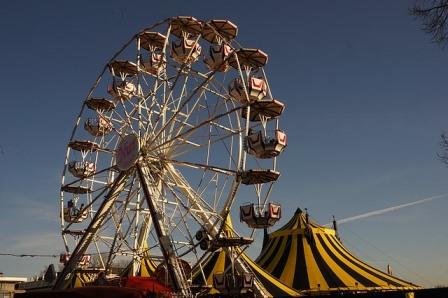- Calls to this hotline are currently being directed to Within Health, Fay or Eating Disorder Solutions
- Representatives are standing by 24/7 to help answer your questions
- All calls are confidential and HIPAA compliant
- There is no obligation or cost to call
- Eating Disorder Hope does not receive any commissions or fees dependent upon which provider you select
- Additional treatment providers are located on our directory or samhsa.gov
Making Time for Fun: Incorporating appropriate activities during ED recovery

Contributor: Courtney Howard, B.A., Executive Assistant at Eating Disorder Hope and Addiction Hope
It is important to take time during your recovery journey to engage in fun activities that are good for your soul. This is conducive to overall mental health and your long-term recovery process. Though it might seem like every second of every day must be focused on building your new life free from your eating disorder, this does not mean that you cannot have some fun.
If you have recently discharged from treatment or are an outpatient program, it might seem like you have to immediately get back into your regular activities with school, work, etc. While it might be important to put some of your energy toward these aspects of your daily life, remember that allowing yourself to have fun and practice self-care are integral parts of your journey.
Practicing Self-Care
 Fun has a different definition for every person. Some people think the Coachella music festival is their ultimate idea of fun, while for others it is their worst nightmare. Some prefer going out with big groups while others prefer making dinner at home for a more intimate group of friends. Whatever your idea of fun might be, giving yourself permission to have your own version of fun is a form of self-care.
Fun has a different definition for every person. Some people think the Coachella music festival is their ultimate idea of fun, while for others it is their worst nightmare. Some prefer going out with big groups while others prefer making dinner at home for a more intimate group of friends. Whatever your idea of fun might be, giving yourself permission to have your own version of fun is a form of self-care.
Many self-care rituals also vary depending on the individual. Self-care can be as simple as staying in and painting your nails, or it can be calling up a friend and making plans to go out if you’ve had a rough day at work. In essence, anything that improves your mental health and is something you are doing for yourself can be considered self-care.
If you are further along in your recovery, self-care might be baking cookies for yourself or going on a hike with friends. Wait to use food or exercise as self-care until you are confident your eating disorder will not be triggered.
Fun Activities with Loved Ones
 It can be important to be surrounded by your support system while in recovery. Friends and family might be concerned and prefer you be extra cautious, but you can let them know that it is okay to go out and have fun. You do not need to start going on rollercoasters every day, but even going to a concert or seeing your favorite play at a local theatre can be a fun and rewarding outing.
It can be important to be surrounded by your support system while in recovery. Friends and family might be concerned and prefer you be extra cautious, but you can let them know that it is okay to go out and have fun. You do not need to start going on rollercoasters every day, but even going to a concert or seeing your favorite play at a local theatre can be a fun and rewarding outing.
Spending time doing fun things with loved ones can also help you build up the relationships that were damaged by your eating disorder. It can be so meaningful to rebuild these relationships and regain trust that might have been broken when you were sick.
The Dating Scene
 If you are single, it might be daunting to get out on the dating scene while in recovery. How do you explain that you have to stop for a snack mid-afternoon no matter what you are doing so you can adhere to your meal plan, or that “having a light dinner” isn’t an option for you? How do you explain what you do with your day if you are in a partial hospitalization or intensive outpatient program?
If you are single, it might be daunting to get out on the dating scene while in recovery. How do you explain that you have to stop for a snack mid-afternoon no matter what you are doing so you can adhere to your meal plan, or that “having a light dinner” isn’t an option for you? How do you explain what you do with your day if you are in a partial hospitalization or intensive outpatient program?
The reality is that anyone who does not want to date you because you are in recovery is someone who probably shouldn’t be in your life. If they are not going to be supportive of your journey, what is the point of using your valuable time and energy on them?
If you meet someone you connect with, do not let fear of their response to your past struggles keep you from exploring a relationship. Everyone has things they have overcome; this is part of what makes people so fascinating. That being said, if you do not feel ready to disclose your recovery journey, that is your prerogative. There are plenty of things to discuss over dinner and a movie that have nothing to do with your eating disorder.
What Can I Do?
If you cannot find a fun activity to engage in, either by yourself or with others, think back to what you did before you became sick. This might be difficult for you to remember if you were in your eating disorder for years. Just remember that something as simple as riding a bike or an evening of arts and crafts can do wonders for your mental health and recovery journey.
Community Discussion – Share your thoughts here!
What types of activities do you enjoy and participate in, in your eating disorder recovery?
 About the Author: Courtney Howard is the Executive Assistant for Eating Disorder Hope and Addiction Hope. She graduated summa cum laude with a B.A. from San Diego State University, holds a paralegal certificate in Family Law, and is a Certified Domestic Violence Advocate. After obtaining her certification as a life coach, Courtney launched Lionheart Eating Disorder Recovery Coaching in 2015 and continues to be a passionate advocate for awareness and recovery.
About the Author: Courtney Howard is the Executive Assistant for Eating Disorder Hope and Addiction Hope. She graduated summa cum laude with a B.A. from San Diego State University, holds a paralegal certificate in Family Law, and is a Certified Domestic Violence Advocate. After obtaining her certification as a life coach, Courtney launched Lionheart Eating Disorder Recovery Coaching in 2015 and continues to be a passionate advocate for awareness and recovery.
The opinions and views of our guest contributors are shared to provide a broad perspective of eating disorders. These are not necessarily the views of Eating Disorder Hope, but an effort to offer discussion of various issues by different concerned individuals.
We at Eating Disorder Hope understand that eating disorders result from a combination of environmental and genetic factors. If you or a loved one are suffering from an eating disorder, please know that there is hope for you, and seek immediate professional help.
Last Updated & Reviewed By: Jacquelyn Ekern, MS, LPC on June 28, 2016
Published on EatingDisorderHope.com

The EatingDisorderHope.com editorial team comprises experienced writers, editors, and medical reviewers specializing in eating disorders, treatment, and mental and behavioral health.

